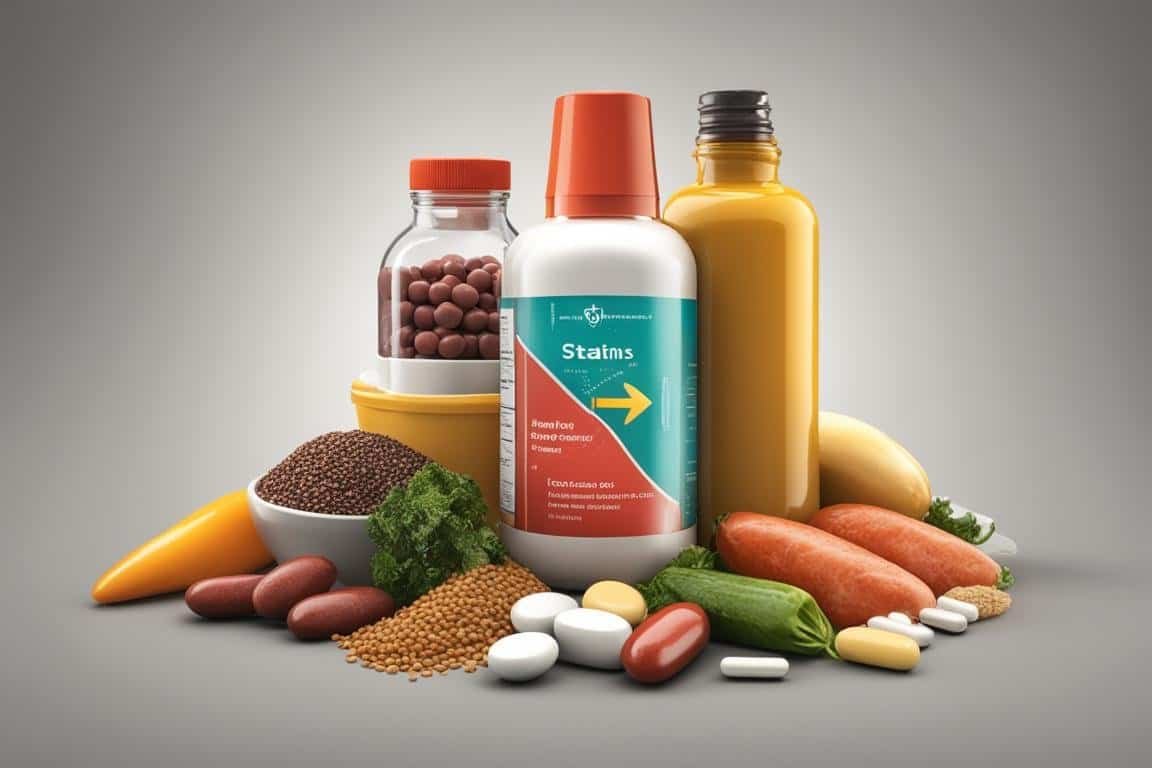If you have a history of liver disease, you may be wondering if statins are safe for you. Can you use this medication to manage your cholesterol levels without causing harm to your liver? Let’s explore the safety of statins in patients with liver disease and what the research says.
Key Takeaways:
- Research shows that statins are generally safe for use in patients with liver disease.
- The benefits of statins outweigh the potential risks in liver disease patients.
- Statins can reduce liver decompensation, hepatocellular carcinoma, infections, and death in patients with liver disease.
- Regular monitoring of liver enzymes is recommended to ensure the safety and efficacy of statin therapy.
- Further research is needed to confirm the associations and determine the optimal use of statins in patients with liver disease.
The Effect of Statins on Liver Function
Statins have proven to have multiple beneficial effects on liver function. These medications have vasodilatory properties, which means they can lower portal vein blood pressure, thereby reducing the strain on the liver. Additionally, statins possess anti-inflammatory properties that can help decrease inflammation and damage in the liver.
Furthermore, statins can influence vascular reactivity and remodeling, which can be particularly advantageous for individuals with liver fibrosis. These medications have been found to have anti-inflammatory and antifibrotic effects in various tissues, including the liver. Evidence suggests that statins can help slow down the progression from chronic liver disease to cirrhosis, leading to a reduced risk of decompensation, hepatocellular carcinoma, and death.
Overall, statins play an important role in maintaining liver health and preventing complications related to liver disease. Their positive impact on liver function makes them a valuable medication for individuals with liver issues.
Benefits of Statins on Liver Function:
- Lowering portal vein blood pressure
- Reducing inflammation and damage in the liver
- Affecting vascular reactivity and remodeling
- Anti-inflammatory and antifibrotic properties in the liver
- Reducing progression from chronic liver disease to cirrhosis
- Decreased risk of decompensation, hepatocellular carcinoma, and death
Benefits of Statins in Different Subgroups of Patients with Liver Disease
Research has shown that statin therapy can offer significant benefits for patients with liver disease. Numerous studies have investigated the effects of statins in different subgroups of patients, and while some variations exist, overall benefits have been observed across the board.
In patients with fatty liver disease or alcoholic liver disease, statins have demonstrated a greater magnitude of beneficial effects compared to those with viral hepatitis. These patients have experienced improvements in liver function, reduced inflammation, and decreased risk of disease progression.
However, the benefits of statin treatment are not limited to specific disease subgroups. In fact, patients with compensated liver disease, regardless of the underlying cause, have shown significant benefits from statin therapy. These benefits include reduced liver decompensation, lowered risk of hepatocellular carcinoma, decreased susceptibility to infections, and improved overall survival.
While the exact mechanisms behind these benefits are not yet fully understood, statins are known to possess anti-inflammatory and antifibrotic properties that contribute to their positive effects. Additionally, the ability of statins to lower cholesterol levels and improve lipid profiles may also play a role in their benefits for liver disease patients.
It is important to note that statin precautions should still be taken when considering their use in patients with liver disease. Close monitoring of liver enzymes is essential to ensure the safety and efficacy of statin therapy.

Overall, the growing body of evidence suggests that statins have the potential to provide significant benefits to patients with liver disease. However, it is crucial to assess each patient’s individual circumstances and consult with a healthcare professional to determine the appropriateness of statin therapy in their case.
Statins and Liver Disease Severity
The severity of liver disease plays a crucial role in determining the suitability of statin therapy and its impact on patient survival. In some cases, patients with advanced cirrhosis may be too ill to benefit from statins and may face a higher risk of complications associated with statin use.
However, for patients with compensated cirrhosis, particularly those with Child-Pugh A liver disease and without other signs of liver failure, statin therapy has shown significant benefits, including improved survival rates.
Research studies have demonstrated that statins can effectively reduce liver decompensation, hepatocellular carcinoma, infections, and mortality among patients with compensated cirrhosis. These findings highlight the potential value of statins in managing liver disease and its associated complications.
Incorporating statins into the treatment plan of patients with compensated cirrhosis can have a positive impact on their overall prognosis. However, it is essential to carefully evaluate each patient’s individual condition and consider the benefits and risks of statin therapy.
Consulting with a healthcare professional who specializes in liver disease is crucial for determining the suitability of statins and tailoring the treatment approach to each patient’s unique needs.
Statin Safety and Monitoring in Patients with Liver Disease
The safety of statins in patients with liver disease can be ensured through regular monitoring of liver enzymes. It is important to closely monitor aminotransferase levels to detect any signs of liver toxicity or muscle damage. If the levels of alanine aminotransferase (ALT) or aspartate aminotransferase (AST) double, it is recommended to stop the statin medication.
Elevation in liver enzymes with statin therapy is dose-related, so it is advisable to begin statin therapy at low doses in patients with liver disease. Furthermore, it is essential to regularly check liver enzymes after any increase in the statin dosage to ensure safety and monitor potential adverse effects.

Comparison of Different Statin Formulations
When it comes to statin therapy in patients with liver disease, the choice of statin formulation is an important consideration. However, current research indicates that there are no significant differences observed among different statin formulations in terms of safety and efficacy for liver disease patients.
Commonly used statins such as simvastatin, atorvastatin, and pravastatin have all been found to be similarly effective in managing cholesterol levels and reducing the risk of cardiovascular events in patients with liver disease. These statins have a well-established track record and are widely prescribed.
While there may be small variations in how individual patients respond to different statins due to genetic polymorphisms, these differences are not significant enough to warrant a preference for one statin over another in the general liver disease patient population. Therefore, the choice of statin formulation should be based on factors like cost, tolerability, and patient preference.
Comparison of Statin Formulations in Liver Disease
| Statin Formulation | Efficacy | Safety | Common Side Effects |
|---|---|---|---|
| Simvastatin | Effective in reducing LDL cholesterol levels | Generally safe for use in liver disease patients | Muscle pain, headache, stomach upset |
| Atorvastatin | Effective in reducing LDL cholesterol levels | Generally safe for use in liver disease patients | Muscle pain, headache, stomach upset |
| Pravastatin | Effective in reducing LDL cholesterol levels | Generally safe for use in liver disease patients | Muscle pain, headache, stomach upset |
As always, it is crucial for healthcare professionals to assess each patient’s individual medical history, liver function, and overall health before prescribing statin therapy. Regular monitoring of liver enzymes and lipid levels is also recommended to ensure the safety and efficacy of statin treatment.
Other Benefits and Risks of Statins in Liver Disease
Statins offer several benefits in the context of liver disease. They contribute to the reduction of liver disease progression, lowering portal hypertension, and retarding the development of liver cancer (carcinogenesis). However, it is important to note that the specific benefits of statins in cardiovascular or nonhepatic outcomes for patients with liver disease have not yet been established due to insufficient evidence.
Despite the lack of conclusive evidence regarding nonhepatic benefits, studies have shown promising results regarding infection rates in patients with cirrhosis who are taking statins. It is believed that statin use may contribute to lower rates of liver decompensation, leading to a reduced risk of infection.
Conclusion
In conclusion, the available data strongly suggest that statins can be safely used in patients with liver disease, with the benefits clearly outweighing the potential risks. Numerous studies have demonstrated that statins can reduce liver decompensation, hepatocellular carcinoma, infections, and even mortality in individuals with liver disease. These findings highlight the significant positive impact that statins can have on liver health.
However, it is crucial to monitor liver enzymes regularly in patients undergoing statin therapy to ensure both safety and efficacy. Regular check-ups of aminotransferase levels, such as alanine aminotransferase (ALT) and aspartate aminotransferase (AST), are recommended to detect any signs of liver toxicity or muscle damage. If these enzymes double in levels, statin therapy should be discontinued.
While the existing evidence is promising, further prospective, randomized, controlled trials are necessary to confirm these associations and establish the optimal use of statins in patients with liver disease. By continuing to advance our understanding through rigorous scientific study, we can refine our approach to statin therapy and ensure that individuals with liver disease receive the most appropriate treatment for their specific needs.

